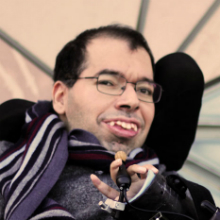An Open letter to Minister for the NDIS Stuart Robert

Dear Minister Robert
We need to talk.
You might be surprised to hear this but I agree with you on a number of things.
We both agree that the NDIS is a life-changing government initiative. I am thankful that your government has fully funded the scheme to enable people like me to receive the services that we need to live a good life. Without it, people like me would not survive.
We both agree that it’s unfair that some people have to pay for their assessments to access the scheme. I’m glad that you’re working to solve that.
We both agree that some people are disadvantaged because they can’t access therapists who have the appropriate skills and knowledge to submit the kind of evidence that is required to get the funding that they need.
And we even agree that sometimes therapists can have a conflict of interest in making recommendations about support – because they stand to benefit if their client receives additional funding. I really don’t think it is a widespread problem but I do agree that it is something we should keep in mind.
So what’s the solution?
Well that’s something that we need to work on together. When I say we, I mean the government, the National Disability Insurance Agency, people with disabilities, our organisations and other experts in the field.
We should do that before you make any decisions. And certainly before you draft legislation to introduce independent assessments and place predetermined restrictions around what is reasonable and necessary.
What you are proposing is a pretty big change.
It seems like my goals will no longer be relevant when developing my plan and that’s a pretty big deal. We know that good planning needs to focus on what a person wants in their life and what’s important to them. So planning without understanding what the person wants is really concerning to me and many other people with disabilities. We designed the NDIS to put the person, our needs and choices at the centre of the scheme. We did this so people with disabilities could be in control of their own lives.
I have been keeping an open mind about independent assessments. But having been through one, as a volunteer in the pilot, I think a lot of work needs to be done so that they are not harmful to the people taking part.
Some of the questions were very personal, uncomfortable and difficult to answer. I was asked to think about what my life would be like without support. Over and over again, over 20 times, possibly more. I need support to eat, breathe, and to wipe my bum. I don’t want to be forced to think about my life without support. I felt unable to answer your questions. But I had to.
The assessor asked me if I need support to have sex? I do Minister. My hands are paralysed and I can’t touch myself, let alone someone else. I really wasn’t sure how much information to give my assessor so I just looked away, trying to keep myself together.
The assessor also wanted to talk to someone about me without me in the room. He said it could be a family or friend. That felt wrong to me but I agreed to go along with it. But I couldn’t find anyone who knows me well enough who feels comfortable having that conversation without me involved. Everyone I asked has told me that it feels wrong to them. So I’m not the only one that feels this way.
Minister, there are problems but I think we can work them out if we work together on this. We need to stop and go back to the drawing board. We need to bring together people with disabilities, disability organisations and other experts in the field to codesign solutions and come up with a framework that we can all agree on.
Arguing with one another through the media is not working.
We need to talk, I hope you’re up for it.
Dr George Taleporos is a disability rights advocate. He has over 20 years of experience in the disability field, focussed predominantly on advocacy, human rights policy and practice, service development and management. He has a PhD in the field of psychology, a Graduate Diploma in educational psychology and Honors in sociology. Dr George is the policy manager at Summer Foundation, the Acting Chair of the Victorian Disability Advisory Council and an opinion writer for Every Australian Counts. These are his personal views.


Join the conversation